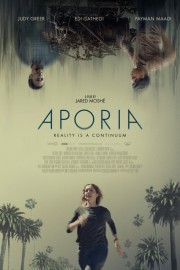Aporia
One of the things most movies involving changing the past do is send one or more of the protagonists. But what if we just see the consequences of their meddling, and not the actions themselves? In reality, Jared Moshe isn’t doing anything unique in his film, “Aporia,” but by anchoring all of the action in the character’s “present,” we see as they wrestle with the choices they’ve made, and see how opening Pandora’s Box, as it were, is more complicated than just your intended purpose.
Sophie (Judy Greer) has been out of sorts since the death of her husband, Mal (Edi Gathegi), at the hands of a drunk driver. Their daughter, Riley (Faithe Herman) has struggled in school, her passions are no longer passions, and they are drowning. A family friend, Jabir (Payman Maadi), might have the answer to taking away their grief. A former physicist, the loss of his own family has caused him to work on a machine that allows the user to change something from the past to affect the present. Originally created in the hopes he could be with his own family again, he wants to use it with Sophie, and bring Mal back. When they do the unthinkable, though, it sets off a chain reaction of events that will lead them to question every decision they’ve made.
It didn’t occur to me while watching the movie, as I was engrossed in what the film was doing, but in writing this review, this plot very much feels like the narrative fulcrum of this summer’s “Flash” movie, where Barry Allen’s hopes to save his mother lead to unexpected consequences. What makes Moshe’s film more compelling is how both the characters, and us, are presented with the here and now of their choices, and it is their responsibility to figure out the differences, why they matter, and whether anything they can do will fix it. This film doesn’t ask us to go between timelines, but to go through the one the characters set for themselves. Each choice has consequences that results in hard questions needing to be asked. If we’re able to make our situation better, is it worth someone else’s potentially being worse? Is our happiness worth someone else important to us possibly not being happy? Is the answer to numbing our pain of loss changing things so the source of that pain doesn’t happen? “The Flash” kind of deals with these issues, but doesn’t really care as much about them as it does about cameos and time travel comedy. They are the whole point of “Aporia,” and Moshe explores them in a simple, thoughtful narrative.
The central performance in this film is Greer, and she captures the pain Sophie is going through, and the anxiety of what their choices is resulting in. Gathegi and Maadi are equally part of why “Aporia” connects with us, though, and the three of them carry this morally, and narratively, complicated story through to its conclusion.










